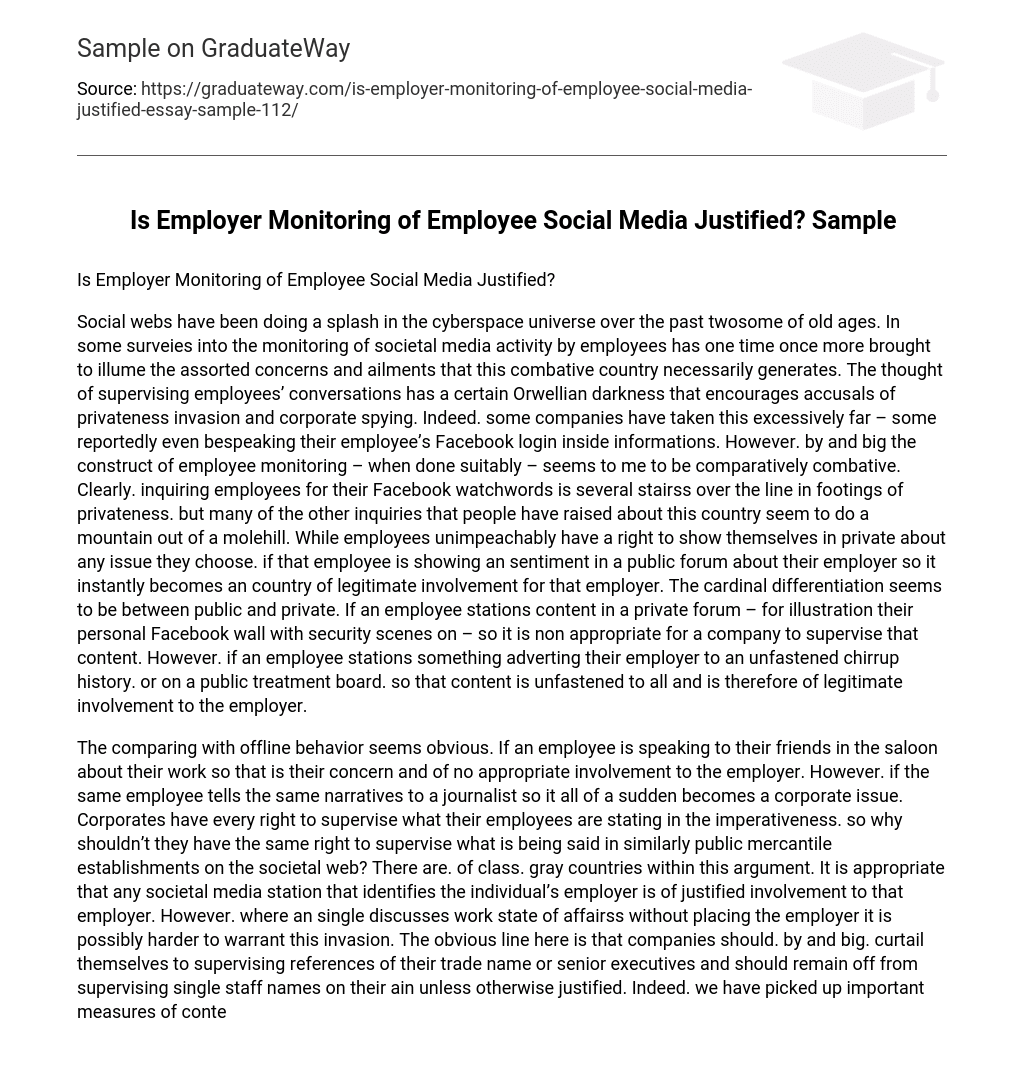Is Employer Monitoring of Employee Social Media Justified?
Social webs have been doing a splash in the cyberspace universe over the past twosome of old ages. In some surveies into the monitoring of societal media activity by employees has one time once more brought to illume the assorted concerns and ailments that this combative country necessarily generates. The thought of supervising employees’ conversations has a certain Orwellian darkness that encourages accusals of privateness invasion and corporate spying. Indeed. some companies have taken this excessively far – some reportedly even bespeaking their employee’s Facebook login inside informations. However. by and big the construct of employee monitoring – when done suitably – seems to me to be comparatively combative. Clearly. inquiring employees for their Facebook watchwords is several stairss over the line in footings of privateness. but many of the other inquiries that people have raised about this country seem to do a mountain out of a molehill. While employees unimpeachably have a right to show themselves in private about any issue they choose. if that employee is showing an sentiment in a public forum about their employer so it instantly becomes an country of legitimate involvement for that employer. The cardinal differentiation seems to be between public and private. If an employee stations content in a private forum – for illustration their personal Facebook wall with security scenes on – so it is non appropriate for a company to supervise that content. However. if an employee stations something adverting their employer to an unfastened chirrup history. or on a public treatment board. so that content is unfastened to all and is therefore of legitimate involvement to the employer.
The comparing with offline behavior seems obvious. If an employee is speaking to their friends in the saloon about their work so that is their concern and of no appropriate involvement to the employer. However. if the same employee tells the same narratives to a journalist so it all of a sudden becomes a corporate issue. Corporates have every right to supervise what their employees are stating in the imperativeness. so why shouldn’t they have the same right to supervise what is being said in similarly public mercantile establishments on the societal web? There are. of class. gray countries within this argument. It is appropriate that any societal media station that identifies the individual’s employer is of justified involvement to that employer. However. where an single discusses work state of affairss without placing the employer it is possibly harder to warrant this invasion. The obvious line here is that companies should. by and big. curtail themselves to supervising references of their trade name or senior executives and should remain off from supervising single staff names on their ain unless otherwise justified. Indeed. we have picked up important measures of content from client’s employees without specifically supervising for persons. Examples include a bringing driver who tweeted about how small work he did and an person who expressed support for a group protesting against their employer.
These stations – where the single clearly named their employer – could hold had a important impact on the companies’ public reputes and hence were of justified involvement to the companies in inquiry. Yes. there are subsequent inquiries about how a company should move upon this kind of information. Whether one should train an employee for discoursing workplace conditions online could be a legal minefield. but that is an HR issue and non a monitoring 1. What seems certain is that the monitoring of employees’ usage of a company’s trade name on the societal web is non merely justified but potentially extremely valuable. But besides while most think this is a inquiry of moral fundamental law. it nevertheless is a inquiry each employer must inquire themselves if it is worth the problem of losing the trust of their employees. So in portion I believe that employers must non let societal webs to be accessed at work or during the hours of work. But the employer must besides cognize that with engineering that is continually turning it would be difficult to halt. lone manner would be allow employees cognize that there are penalties set in order to forestall this from happening.





